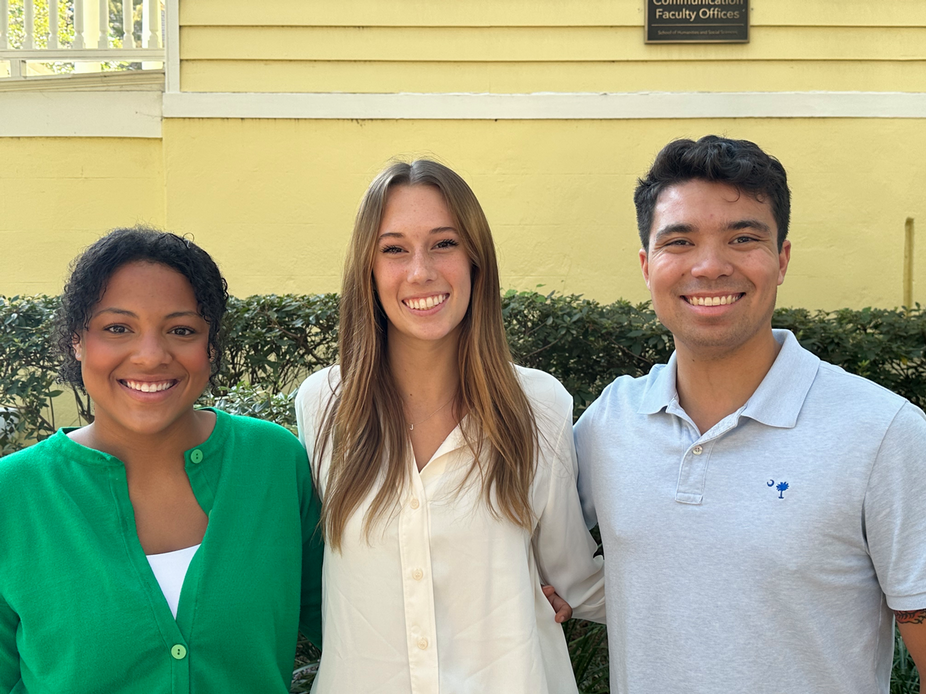Students Benefit from Mentor-Protégé Program
The Martin Center established the Mentor-Protégé Program in 2006 to provide students the opportunity to learn from communications experts from the Department of Communication National Advisory Council and/or distinguished communication alumni.
Growth of the Program
Since that time, the program has been expanded to include distinguished alumni and local professionals among the ranks of the mentors and the program has been revised to better meet the needs of students. Grounded in the research the Martin Center has conducted on best practices in mentoring, the program has been restructured to include more preparation for mentors and protégés and to enhance the matching process.
To ensure students are able to take full advantage of the program, they are required to enroll in a 1-hour credit course designed to prepare them for establishing, developing and maintaining strong mentoring relationships. The course also gives the Martin Center team the opportunity to get to know students and then match them with the proper mentor based on shared career interests and compatibility.
To date, more than 500 students have participated in the Mentor-Protégé Program. Below are three students who share how the program has benefitted them.
Meet the Protégés

For Griffin Hogan, the Mentor-Protégé Program has been a great help as he prepares for graduation. Hogan came to the College after serving in the Marine Corps for four years. He chose to major in communication because he enjoys interacting with people.
Hogan applied to the Mentor-Protégé Program because of his high esteem for Beth Goodier, associate professor of communication and director of the Martin Center. “I know Dr. Goodier, so when she sent out the email about the program, I knew it was a good opportunity. Honestly, the program has been everything I wanted it to be and more.”
For the communication major, the 1-hour credit course helped him manage the power dynamic that comes with a mentor-mentee relationship. Having that understanding made his interaction with his mentor, Michael Fanning, retired director of sustainable development for Michelin North America, more fulfilling.
Hogan and Fanning meet over Zoom once a month, following an agenda Hogan puts together so they can both prepare for the meeting. It has been a time for Hogan to bounce ideas around and plan for the future. He is grateful for Fanning’s reassurance that it’s okay not to know what you want to do.
“Mentorship is super important to me,” says Hogan. “It’s intimidating to interact with people who are so accomplished, but it’s a great experience. I wouldn’t be where I am now without it.”
Luna Sepaniak, a communications and entrepreneurship double major, agrees. She learned about the program through Amanda Ruth-McSwain, associate professor of communication, and greatly appreciates her mentor, Steve Cody, founder and CEO of Peppercomm, Inc.
My mentor and supporters have helped me gain confidence in how I present myself professionally, develop my networking skills, and realize my goals while pushing me to reach for greater ones.
Luna Sepaniak
For Emma Potter, the program has given her the resources to achieve her goal of an internship. She frequently meets with her mentor, Erin Dempsey ’16, who serves on the Department of Communication National Advisory Council and works as chief of staff, Regulatory & Public Affairs, with the Brunswick Group, to talk about internships.
“I will be applying for internships this summer, and Erin has given me great tips on how to stand out when I apply,” says the communication major and marketing minor. “She has helped build my confidence when talking with people in the field and taught me how to write my resume to target the communication field.”
One of Dempsey’s recommendations was to gain more experience at the College to make her stand out more. Potter took the initiative to join the Department of Communication Student Outreach Team where she handles public relations — everything from social media to events.
Hogan, Sepaniak and Potter are just a few examples of the many communication majors who have benefited from the Mentor Protégé Program. The program serves as an excellent aid as students transition from university to the work force.